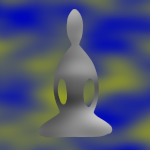Dear Friends,
There’s a poem that Susie Harrington often recites at retreats I’ve attended. It has become a bit of a touch-point for me – anytime I need to reconnect to the “why am I doing this”…
Bhuta Thera: No Greater Contentment
When the thundering storm cloud roars out in the mist,
And torrents of rain fill the paths of the birds,
Nestled in a mountain cave, one meditates.
— No greater contentment than this can be found.When along the rivers the tumbling flowers bloom
In winding wreaths adorned with verdant color,
Seated on the bank, glad-minded, one meditates.
— No greater contentment than this can be found.When in the depths of night, in a lonely forest,
The rain-deva drizzles and the fanged beasts cry,
Nestled in a mountain cave, one meditates.
— No greater contentment than this can be found.…
Devoid of fear …, one meditates.
— No greater contentment than this can be found.When one is happy — expunged of … grief,
https://www.accesstoinsight.org/tipitaka/kn/thag/thag.09.00x.olen.html
Unobstructed, unencumbered, unassailed —
Having ended all defilements, one meditates.
— No greater contentment than this can be found.
One of the things I love about this poem is that it points to a contentment that can be found in any circumstances – good weather or bad, scary or safe, fearful or happy.
Susie has also noted that this contentment is not oblivious – one takes in the conditions, and there is a capacity to meet the range of conditions. Christina Feldman echos this too: “Contentment is not the absence of the difficult and challenging, but the absence of our resistance and argument with the difficult and challenging.” (page 100)
Susie also said we can acknowledge that this may not be our current condition – the contentment might not be available in the moment – but we are planting seeds – orienting towards this heart of gladness.
Christina notes that discontentment can be skillful too:
There is also a response born of knowing the landscape of our own hearts that is a creative discontentment. A friend remarked that undertaking the path of being mindful of his own mind was akin to volunteering to endure one insult after another, as he saw the repetitive nature of many of his thoughts and reactions. Yet it was that very awareness that inspired him to persevere, to cultivate the ennobling qualities of kindness, compassion, and equanimity. There was joy in seeing the hold of those patterns of reactivity begin to loosen. It is creative discontentment that leads us to say no to the unacceptable, to commit to uprooting suffering and its origins, and to set ourselves on a path dedicated to the awakening of our world.
page 102
Christina suggests a line of inquiry for your sitting meditation:
“What in this moment is lacking? What is being asked of me for contentment to be present?” (page 102)
You don’t need to search for an answer, but drop the question in and see what emerges, if anything.
Warm wishes,
Andrea
